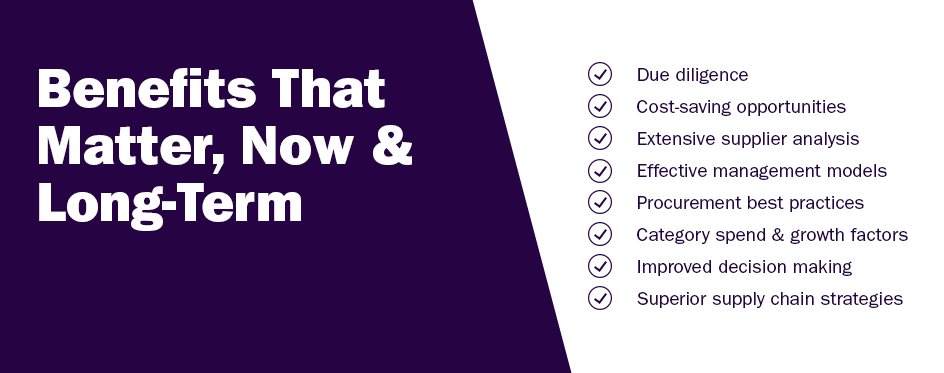Growing intricacy of laws pertaining to tax will lead to increased demand for Tax Advisory Services across the globe
Tax Advisory Services Category - Procurement Intelligence
The tax advisory services category is anticipated to witness growth at a CAGR of 9.3% from 2023 to 2030. In 2022, North America held a substantial share in the global category, followed by Europe and Asia Pacific. The Asia Pacific region is expected to witness the fastest growth rate over the forecasted timeframe owing to evolving tax regulations, growing need for tax compliance, rise in globalization, increased awareness of tax planning, and technological advancements. In Europe, an increasing number of organizations are outsourcing tax-related services to reduce costs, ensure compliance with complex tax laws, and navigate cross-border tax challenges. By outsourcing tax-related functions, finance teams are investing their time in strategic undertakings rather than spending time in repititive, labor-intensive tax-related activities.
Key sectors utilizing tax advisory services include real estate, BFSI, IT & Telecom, media and entertainment, manufacturing, energy & utilities, retail, hospitality, tourism, food and beverages, and healthcare. For instance, by availing tax advisory services, companies in the BFSI industry are improving accuracy in tax filing and adherence to regulatory requirements. Similarly, companies in the hospitality, tourism, and food and beverages industries are able to streamline their finance and tax accounting operations while guaranteeing compliance with industry-specific regulations. Likewise, companies in the retail and manufacturing sectors are increasingly availing tax advisory services to improve financial planning, provision, and compliance.
Besides cloud computing, artificial intelligence (AI) has gained significant popularity in the industry. AI technology is a powerful instrument for tax research that provides both qualitative and quantitative insights into complicated topics. Tax professionals can guarantee accuracy in calculating tax liabilities by using AI-powered tax software, which finds potential credits and deductions that taxpayers could have missed and ultimately lowers their tax burden. AI can also benefit tax professionals by automating repetitive operations, which frees up time for more complicated tax issues that call for human expertise. In addition, suppliers in the tax advisory services category are increasingly adopting tax automation technologies to optimize and streamline tax preparation processes.
The demand for tax advisory services intensified post the outbreak of the COVID-19 pandemic, due to a rapidly changing global tax environment, and tax authorities increasingly adopting a real-time, digital tax environment. For instance, in the post-pandemic era, corporations in Brazil were required to disclose full invoice details before being able to obtain a valid invoice number from tax authorities. Moreover, as businesses all over the world started operating remotely, the need for automated and AI-based tax filing systems has increased post the outbreak of the pandemic. In addition, the implications that the pandemic created on the category include continuously evolving tax provisions, challenges of compliance, restructuring of businesses, and rising requirement of financial planning.
Request a free sample copy or view report summary: Tax Advisory Services Procurement Intelligence Report
Tax Advisory Services Sourcing Intelligence Highlights
-
The tax advisory services category exhibits a moderately consolidated landscape, with few of the large players holding majority of the market share.
-
Threat of new entrants in the category is high. Entry barriers are low as tax advisory consulting is not a capital-intensive business, thereby encouraging smaller players to consider a market foray.
-
India is the preferred low-cost/best cost country for sourcing tax advisory services. Hiring specialists in India is less expensive than in the U.S.; this is because the values of the currencies in the two countries differ.
-
Consulting fees, technology costs, selling general & administrative (SG&A), tax, and profit are the key cost components in the tax advisory services category. Consulting fees can be bifurcated into salaries, benefits, overtime, cost of subcontractors, and other bonuses.
Tax Advisory Services Procurement Intelligence Report Coverage
Grand View Research will cover the following aspects in the report:
-
Category intelligence along with emerging technology and regulatory landscape
-
Category estimates and forecasts from 2022 to 2030
-
Growth opportunities, trends, and driver analysis
-
Supply chain analysis, supplier analysis with supplier ranking and positioning matrix, supplier’s recent developments
-
Porter’s 5 forces
-
Pricing and cost analysis, price trends, commodity price forecasting, cost structures, pricing model analysis, supply and demand analysis
-
Engagement and operating models, KPI, and SLA elements
-
LCC/BCC analysis and negotiation strategies
-
Peer benchmarking and product analysis
-
Category report in PDF, Excel, and PPT and online dashboard versions
Cost Intelligence Highlights:
Grand View Research has identified the following key cost components for the tax advisory services category:
-
Consulting Fee
-
Salaries
-
Benefits
-
Overtime
-
Cost of Subcontractors
-
Other Bonuses
-
-
Technology Costs
-
Selling General & Administrative (SG&A)
-
Tax
-
Profit
Consulting fee forms the largest key cost component of the tax advisory services category.
List of Key Suppliers in the Tax Advisory Services Category
-
BDO International Limited
-
CliftonLarsonAllen LLP
-
Crowe LLP
-
Deloitte Touche Tohmatsu Limited
-
DPNC Global LLP
-
Ernst & Young Global Limited
-
Grant Thornton LLP
-
KPMG International Limited
-
Marcum LLP
-
PricewaterhouseCoopers International Limited
-
RSM International Ltd.
-
USM-SBC Consulting LLP
Pricing & Purchase Options
Service Guarantee
-
Insured Buying
This report has a service guarantee. We stand by our report quality.
-
Confidentiality
Your transaction & personal information is safe and secure.
-
Custom research service
Design an exclusive study to serve your research needs.
-
24/5 Research support
Get your queries resolved from an industry expert.


